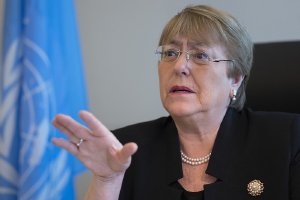Nearly one in 25 Muslim residents of Konasheher County in China’s Xinjiang province has been imprisoned on terrorism charges according to a May 16 article by Associated Press reporters Huizhong Wu and Dake Kang, who describe the county as the world’s “incarceration capital.”

This is based on partially verified data from a hitherto secret list containing the names of more than 10,000 prisoners from the minority Muslim Uyghur community.
The list reveals the magnitude of China’s brutal crackdown on the Uyghur community that the U.S. government and parliaments in Canada and the UK have declared to be genocidal crimes against humanity.
Waging what they claim to be a war on terror, Chinese authorities have incarcerated up to 1.8 million Muslim Chinese citizens in the province in more than 1,300 concentration-style camps, according to the U.S. Commission on International Religious Freedom.
Across the county of roughly 267,000 people, the AP analysis shows Uyghurs—men and women, young and old, of all walks of life—have been sent to prison for two to 25 years. Most were arrested in 2017 with prison terms averaging nine years, long enough that the overwhelming majority of them are likely still behind bars.
This information “confirms what families and rights groups have said for years: China is relying on a system of long-term incarceration to keep the Uyghurs in check, wielding the law as a weapon of repression.”
The article describes the list as “the widest and most granular look yet at who is in prison in Xinjiang.” The identities of the prisoners were obtained from an anonymous source by Gene Bunin, a research scholar on Xinjiang. The source was “a member of China’s Han Chinese majority opposed to the Chinese government’s policies in Xinjiang.”
The county’s incarceration rate, even by conservative estimates, is more than 10 times that of the United States and well over 30 times higher than in the rest of China.
Darren Byler, assistant professor of International Studies at Simon Fraser University, specializing in the Uyghurs in China, says that most imprisoned Uyghurs were arbitrarily arrested for having relatives overseas or for downloading certain smartphone applications. In some cases, all men from entire villages were rounded up, resulting in the uprooting of whole families.
“In no other location have we seen entire populations of people be described as terrorists or seen as terrorists,” Byler said. “The state is trying to reframe the narrative and say… all of these people are actually criminals.”
Uyghurs have long suffered under Beijing’s oppressive rule, which has led to violent clashes with authorities over the years. After the 2001 World Trade Center terrorist attacks in New York, China began using “terrorism” as the justification for their strict control of Uyghurs, especially after a spate of knifings and bombings by a handful of Uyghur militants.
In recent years, Beijing has drastically expanded its definition of extremism to include any displays of religiosity such as growing long beards or wearing a veil. Some of those on the list of imprisoned Uyghurs were charged with “preparing to carry out terrorism.”
Such charges represent what Yale University Sinologist and criminal law scholar Jeremy Daum refers to as “a fig leaf of legality,” partly designed to deflect the mounting international outrage that Beijing has faced for its incarceration of Uyghurs.
“But following the law doesn’t mean justice or fairness,” Daum said. “It just means it’s ‘legal.’”
A New York Times article of November 2019 based on more than 400 pages of leaked internal Chinese documents described China President Xi Jinping’s Sinicization of his country's minority groups and religions as a policy of “absolutely no mercy.” This was borne out in December 2021, when the Chinese ruler pledged to vigorously implement a policy aimed at the Sinicization of religion—or “the shaping of religious affairs in accordance with Chinese culture and the Chinese Communist Party’s socialist ideology.”
_______________
From its beginnings, the Church of Scientology has recognized that freedom of religion is a fundamental human right. In a world where conflicts are often traceable to intolerance of others’ religious beliefs and practices, the Church has, for more than 50 years, made the preservation of religious liberty an overriding concern.
The Church publishes this blog to help create a better understanding of the freedom of religion and belief and provide news on religious freedom and issues affecting this freedom around the world.
The Founder of the Scientology religion is L. Ron Hubbard and Mr. David Miscavige is the religion’s ecclesiastical leader.
For more information visit the Scientology website or Scientology Network.


